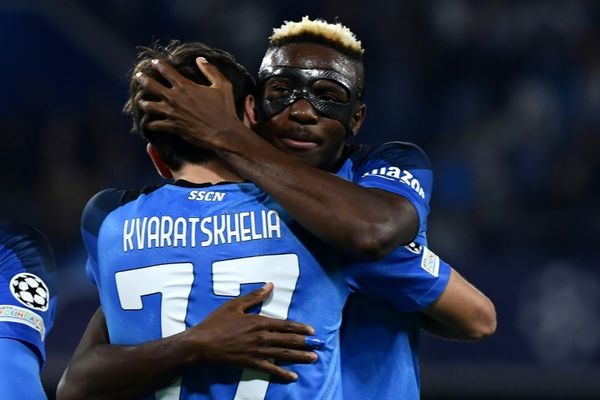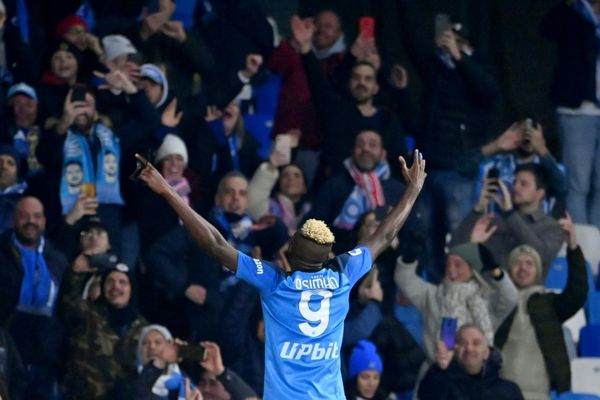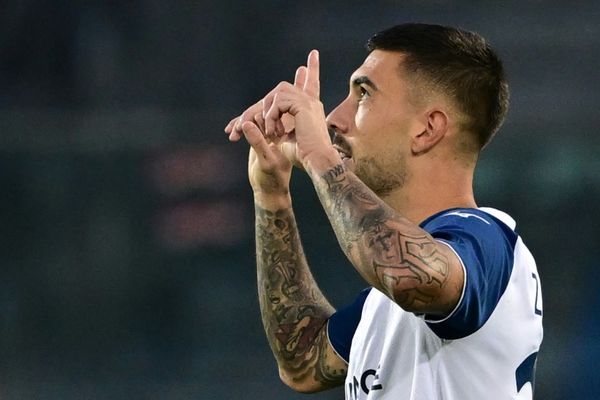
It took 30 years for Massimiliano Allegri’s career to come full circle. In May 1993, as a young midfielder, he scored the goal that set Pescara on the way to an unforgettable 5-1 win over Juventus. The Bianconeri would never concede that many again in Serie A until Allegri, as manager, took them to face Napoli at the Stadio Diego Armando Maradona on Friday night.
The context was very different. Pescara were already relegated in 1993 while Juventus’s minds were on the beach after winning the Uefa Cup a fortnight before. This season, everything is still to play for. Allegri’s team travelled to Naples with aspirations of reopening the title race.
They had won eight league games in a row, keeping a clean sheet every time. After a shabby start, Juventus were suddenly back in contention, seven points off top spot. Napoli, for the first time, looked vulnerable, their undefeated start to the season ended with a 1-0 loss to Internazionale on their return from the winter break.
Among Juventus’s greatest successes during their recent run of nine consecutive league titles was to make even outsiders buy into their “fino alla fine” mantra – “until the end” – creating an aura of inevitability. They were the team who won 25 out of 26 to climb from 12th to first in 2015-16, the ones who always found a goal in the 90th minute when they needed it. – that villain at the end of the horror movie who simply refuses to die.
There is more than one genre of script to be written in football, though. Napoli, owned by the film producer Aurelio De Laurentiis, have been working on an old-fashioned underdog tale. They are chasing a first league title in 33 years on a budget half the size of their opponents this weekend. No side from outside Milan or Turin has won Serie A since 2001.
Napoli’s manager, Luciano Spalletti, leaned into the narrative last week, insisting: “There is no comparison between me and Allegri. His medals speak clearly … he is part of a different category. He is above me and I need to learn from him.”
Just listen to the noise! 🤯
— Football on BT Sport (@btsportfootball) January 13, 2023
A great finish from centre half Amir Rrahmani has Napoli and their supporters in dream land. pic.twitter.com/sFFasSorhX
Does he really believe it, or was he just playing a role? Spalletti has a reputation as a nearly man within Italian football, yet his trophy cabinet is hardly empty. He was the one who led Roma to Coppa Italia triumphs in 2007 and 2008 – their first cup successes since 1991, and not repeated since. He won back-to-back league titles with Zenit in Russia.
He did the better job of putting his team in position to succeed on Friday, sending Napoli out in their usual 4-3-3 and with familiar instructions to hold the ball high up the pitch. Allegri gambled with something new: drafting Federico Chiesa in at right wing-back in a 3-5-2.

The Italian had sparkled in cameo appearances, but this was a bold gambit to line him up in an unfamiliar position for his first start since tearing a cruciate ligament a year ago. Even more so when you consider that he would be opposite the breakout talent of this Serie A season, Khvicha Kvaratskhelia.
With a different manager, this might have been conceived as an aggressive strategy, attack as a form of defence. But Allegri’s Juventus simply do not play that way. Their run of wins had been built on a deep line, disciplined positional play and ruthlessness in key moments. That and, looking at the xG data, a good pinch of luck.
Napoli went after Chiesa repeatedly in the first half, or rather went behind him as he repeatedly got caught up the pitch. Then again, they were dominating Juventus on the opposite flank and through the middle as well. Their opening goal came from the right, Matteo Politano’s cross met by an acrobatic volley from Kvaratskhelia, which Wojciech Szczesny could only claw away for a moment before Victor Osimhen arrived to head home.
A defence that endured 770 minutes without conceding a goal lasted just 14 in Naples, and Kvaratskhelia made it 2-0 before half-time, striding on to Osimhen’s square ball with Chiesa lost at sea. Ángel Di María quickly halved the deficit and Juventus nearly pulled level when Amir Rrahmani deflected a cross toward his own net, but Alex Meret intervened with a stunning reflex save.
At their best, going forward, Juventus were dangerous, as should probably be expected of a side featuring a pair of World Cup winners (one, Leandro Paredes, off the bench) as well as another finalist in Adrien Rabiot. Without the ball, though, they were a mess, and Napoli made sure they did not have it very often.
In the second half the visitors yielded completely. Rrahmani drilled in first-time from a corner, Osimhen headed home another cross from Kvaratskhelia and Eljif Elmas cut in from the right, where he had replaced Politano, to finish with his left foot. The game ended with fireworks and Spalletti chasing Allegri for a handshake with devastatingly deadpan expression.

We have been here before, right, Naples getting prematurely carried away? Were there not explosive celebrations, too, when the Partenopei beat Juventus in 2018, only to blow their title bid against Fiorentina the very next week?
The parallels are obvious but so too are the differences. On the one hand, there is much more of this season left to play; no title was ever won after 18 games. Yet we should also remind ourselves that Napoli were not even top of the table after that victory five years ago – their enthusiasm founded on closing the gap to an exceptional Juventus side who would finish on 95 points.
No such rival has emerged in the first half of this season. Juventus have fought hard to drag themselves back into contention but showed all their underlying frailties on Friday. Inter, after beating Napoli on 4 January, drew at Monza three days later, highlighting their inconsistency. They have lost five games already and conceded 24 goals – the joint-most (alongside 10th-placed Fiorentina) of any team in the top-half of the table.
Atalanta 8-2 Salernitane, Cremonese 2-3 Monza, Internazionale 1-0 Verona, Lecce 2-2 Milan, Napoli 5-1 Juventus, Roma 2-0 Fiorentina, Sassuolo 0-2 Lazio, Torino 0-1 Spezia, Udinese 1-2 Bologna
Monday Empoli v Sampdoria (7.45 GMT)
The defending champions Milan are closest, but still fell nine points behind after drawing at Lecce on Saturday. They were 2-0 down after 23 minutes, leading some observers to question whether they had “lost this game in the hotel”, discouraged by Napoli’s emphatic win just as the Partenopei were by seeing Juventus beat Inter just before that ill-fated Fiorentina match in 2018.
There is time yet for twists and turns, but Napoli’s position is no accident. Kvaratskhelia and Osimhen offer one of the most devastating attacking combinations anywhere in Europe. This is the same team that beat Liverpool 4-1 and Ajax 6-1 in the Champions League, and the Nigerian did not even play in the latter game. Even in worst-case injury scenarios, the likes of Giacomo Raspadori, Hirving Lozano and Giovanni Simeone are waiting in the wings.
Allegri had delivered Spalletti a backhanded compliment in the buildup to this game, describing him as “buffo e divertente” – “zany and fun” – but while there is an undeniable joy to Napoli’s play, embodied in the almost childlike enthusiasm that Osimhen manages to couple to his astonishing technical qualities, this team is deadly serious about where it can go.
Asked if his team had sent a message with this latest win, Spalletti said they had done so “only to ourselves. We have always had that question about whether we were up to these levels. Now we’ve given ourselves a reply.”
| Pos | Team | P | GD | Pts |
|---|---|---|---|---|
| 1 | Napoli | 18 | 30 | 47 |
| 2 | AC Milan | 18 | 15 | 38 |
| 3 | Juventus | 18 | 15 | 37 |
| 4 | Inter Milan | 18 | 14 | 37 |
| 5 | Lazio | 18 | 16 | 34 |
| 6 | Atalanta | 18 | 14 | 34 |
| 7 | Roma | 18 | 7 | 34 |
| 8 | Udinese | 18 | 5 | 25 |
| 9 | Torino | 18 | -2 | 23 |
| 10 | Fiorentina | 18 | -3 | 23 |
| 11 | Bologna | 18 | -6 | 22 |
| 12 | Monza | 18 | -5 | 21 |
| 13 | Lecce | 18 | -2 | 20 |
| 14 | Empoli | 17 | -7 | 19 |
| 15 | Spezia | 18 | -11 | 18 |
| 16 | Salernitana | 18 | -12 | 18 |
| 17 | Sassuolo | 18 | -11 | 16 |
| 18 | Sampdoria | 17 | -22 | 9 |
| 19 | Verona | 18 | -16 | 9 |
| 20 | Cremonese | 18 | -19 | 7 |










